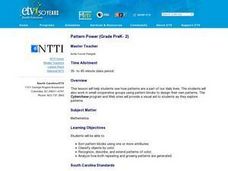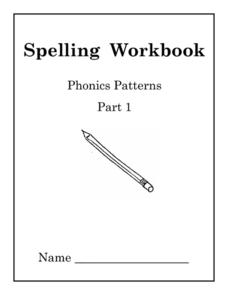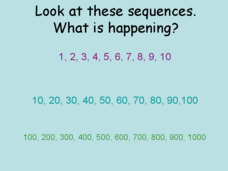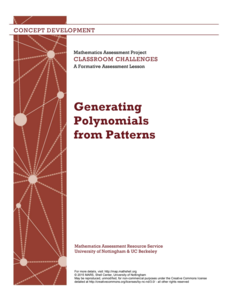Oregon Department of Education
Building and Expanding Patterns
The generation of a number, or shape pattern, is the focus of this math lesson. Pupils are presented with a variety of patterns shapes, and number patterns, then use worksheets embedded in the plan to gain further practice. The...
Curated OER
Finding Patterns
What's the pattern? Learners skip count to complete 12 sequences, some of which increase and some of which decrease. As they solve each number pattern they count by 2, 3, 4, 5, 6, 10, and 100, getting some extra subtraction and addition...
Curated OER
Identify Patterns
To complete these number patterns mathematicians must determine by what number each is constantly increasing. However, this isn't your typical skip counting; scholars count by numbers like 18, 60, and even 101 to fill in the missing...
Curated OER
Identifying Patterns
Explore number attributes and skip counting through patterns! Scholars find the pattern in each of these sequences and continue it by writing in the remaining values. They count consistently by various intervals, sometimes forwards and...
Curated OER
Pattern Power
Young elementary students will discover there are patterns all around them in their daily lives. In groups, they sort pattern blocks by size and color. Using the internet, they create their own type of patterns and share them with the...
Curated OER
Mental Math Problems
In this sequencing instructional activity, learners make a number sequence chart by following the given rule, continue number sequences through seven additional numbers, and continue patterns. Students solve five multiple answer problems.
Willow Tree
Patterns - Numbers, Shapes, etc.
Find the pattern is the name of the game! Learners examine different patterns represented by numbers, shapes, and words. They must describe the pattern, predict the result in a given position, and find an equation that represents a...
Curated OER
Counting by 3s, 4s, and 5s
Can learners recognize the pattern in these number sequences? Here's a hint: it's skip counting by either three, four, or five. There are three examples at the top demonstrating each of these, and scholars complete 15 number sequences to...
Curated OER
Missing Numbers to Twenty
Which number is missing? Beginning counters examine twenty-six number sequences, one for each letter of the alphabet. Each sequence has four numbers, ranging from one to 20. There is one number missing from the sequence, and learners...
Willow Tree
Fibonacci and Other Sequences
Fibonacci is an interesting sequence that forms some unique patterns. Learners explore sequences that do not have the typical arithmetic and geometric patterns. They identify the pattern and find the next consecutive terms....
EngageNY
Integer Sequences—Should You Believe in Patterns?
Help your class discover possible patterns in a sequence of numbers and then write an equation with a lesson that covers sequence notation and function notation. Graphs are used to represent the number patterns.
THUP Games
Monkey Math School Sunshine
Hang out at the beach and listen to some relaxing tunes, all while developing basic math skills. An endless source of fun and learning for young children!
Curated OER
Sequence of Numbers
Reinforcing the math terms, "before," "between," and "after," is the focus of this math PowerPoint. Young mathematicians must fill in the missing number in a sequence of numbers shown on each slide. This presentation should provide...
EngageNY
Sequencing Rotations
Discover the result of a sequence of rotations about different centers. Pupils perform rotations to examine the patterns. They also describe the sequence of rotations that performed to reach a desired result in the ninth installment in a...
Math in English
Number Patterns
Build the pattern recognition skills of young mathematicians with this simple skills practice worksheet. Given nine different sequences of two-digit numbers, children must identify the pattern and determine the next three numbers in...
Curated OER
Ten Red Apples; The Five Senses
A clever lesson designed around an apple awaits your learners. Descriptive words are used to explain what they believe is inside a bag while using their five senses. Students read the story The Apple Pie Tree and are introduced to the...
Curated OER
Alice in Fractalland
Take your class on a field trip to Fractalland where they'll learn all about number and shape patterns. Based on Disney's movie Alice in Wonderland, this resource takes young mathematicians on an adventure as they explore patterns in...
Kathryn J. Davis
Spelling Workbook: Phonics Patterns
Set your pupils straight with spelling and sounds by using these materials for practice. Included here are three booklets and workbooks that cover just about any sound or blend you could think of!
Curated OER
Sequencing and Counting on
This series of slides gives learners an opportunity to count on by 10's in number sequences then discuss how to apply counting on to addition and subtraction problems. Learners count on and back by 1's, 10's, and 100's.
Curated OER
Number Sequences
In this number sequences worksheet, students fill in the blanks for the missing numbers in the number sequences containing 2 digit numbers. Students complete 6 number sequences.
Curated OER
Extending Geometric Patterns
Which square comes next? Each of these sequences is made up of patterned squares in a continuing order. Learners examine more squares to choose which one(s) would correctly continue the pattern. None of these have very complex sequences;...
Curated OER
Pattern Practice
Finishing patterns can be fun and engaging. Here are nine different patterns that have learners determine the rule or determine which image or shape will come next in the sequence. A very well-done presentation.
K20 LEARN
Didn’t We Already Learn That Pattern? Functions/Arithmetic Sequences
Just how many toothpicks does the pattern take? After watching a video of someone building a pattern with toothpicks, groups create methods to find the number of toothpicks needed to accomplish that task. Groups either use explicit...
Mathematics Assessment Project
Generating Polynomials from Patterns
Patterns and polynomials go hand in hand. Budding mathematicians analyze sequences of dot diagrams to discover the patterns in the number of white dots and black dots. They use the identified patterns to write and simplify a polynomial...

























